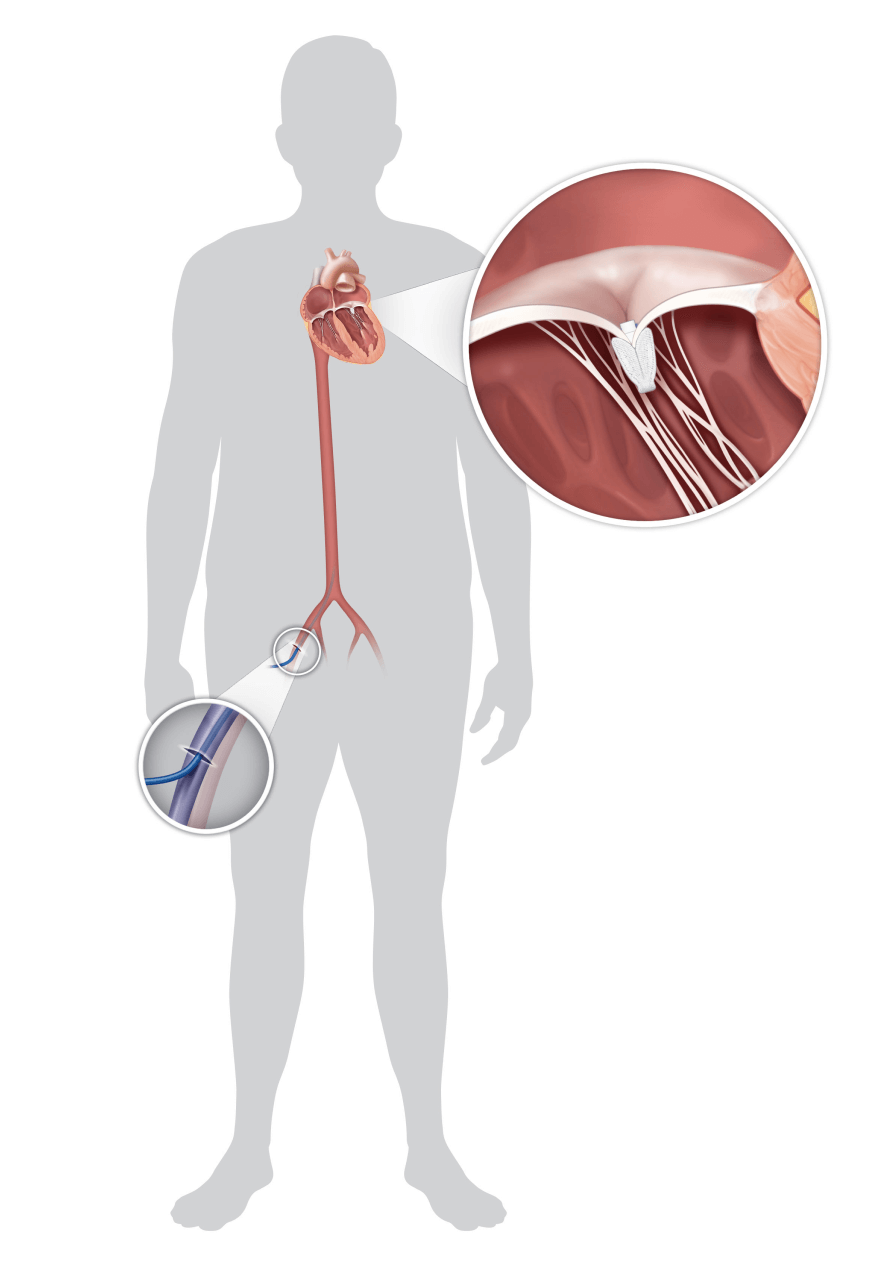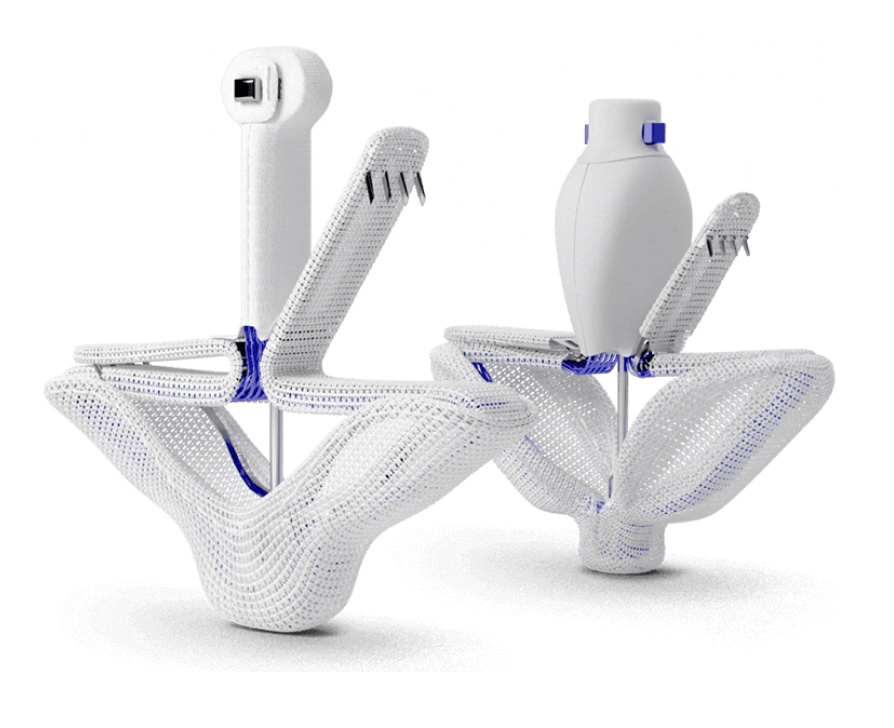Your doctor will make a small cut in your groin area to access the largest vein there.
Mitral valve repair

What is transcatheter mitral valve repair?

Transcatheter mitral valve repair (TMVr), sometimes referred to as transcatheter edge-to-edge repair (TEER), is a procedure to address backward leakage in your mitral valve to help blood flow properly.
If you have mitral regurgitation and your doctor has evaluated you as prohibitive risk for open heart surgery, transcatheter mitral valve repair may be an option for you. This treatment is less invasive than traditional open-heart surgery.
The procedure is performed through a small incision in the leg. Your doctor places a thin tube called a catheter through a delivery system into a large vein in your leg to reach your heart, and then implants a small device to repair the mitral valve.


The PASCAL Precision implant system

The PASCAL Precision implant system is designed to repair the mitral valve and help reduce mitral regurgitation.
Your doctor will guide a small implant to your mitral valve via a catheter-based delivery system through your femoral vein. The implant is secured to the leaflets of your mitral valve, and the central spacer acts as a filler to block backward blood flow.
The PASCAL Precision implant system has two implant sizes: the PASCAL and PASCAL Ace. Your doctor will select the best implant option for your anatomy.
Repairing your leaky valve
Read how the transcatheter mitral valve repair procedure works.
Your doctor will then insert a tube-like device (delivery catheter) through the small cut and direct it to your mitral valve under imaging guidance. The PASCAL implant is attached to the tip of the delivery catheter.
Once the implant is properly positioned in your mitral valve, your doctor will grasp the two leaflets of your mitral valve and secure them together.
Lastly, your doctor will release the implant from the delivery catheter and remove the delivery catheter from your body.
A clinically proven treatment option
The PASCAL system has shown excellent safety and effectiveness in clinical studies.2
After fixing your leaky valve, you may notice fewer symptoms, improved quality of life and increased ability to exercise.2 As with any implanted medical device, there are risks associated with this procedure. The most serious risks are death, stroke, serious bleeding, unplanned repeat procedure or surgery. Talk to your doctor for a full explanation of the benefits and risks.1
of patients avoided heart failure hospitalization with the PASCAL implant at 6 months*2
of patients achieved moderate to no MR with the PASCAL implant at 6 months*2
*Results at six-month post-procedure follow-up
Frequently asked questions
References
- Edwards PASCAL Transcatheter Valve Repair System: Instructions for Use.
- Lim DS, Smith RL, Gillam LD, Zahr F, Chadderdon S, Makkar R, et al. Randomized comparison of transcatheter edge-to-edge repair for degenerative mitral regurgitation in prohibitive surgical risk patients. J Am Coll Cardiol Intv. 2022;15:2523-36.
Important Risk Information
Edwards PASCAL Precision Transcatheter Valve Repair System
Who can be treated:
The PASCAL Precision transcatheter valve repair system (the PASCAL Precision system) is approved for treating patients with abnormality of the mitral valve leaflets and/or its structure, which may be referred to as Degenerative Mitral Regurgitation or Primary Mitral Regurgitation. Patients should work with their doctor and a specialized Heart Team, which should include a cardiac surgeon experienced in mitral valve surgery and a cardiologist experienced in mitral valve disease, to confirm their surgical risk. The specialized Heart Team will determine if the patient is a suitable candidate for the PASCAL procedure.
Who should not use:
The PASCAL Precision system should not be used in patients who:
- Cannot tolerate certain blood thinners during or after the procedure
- Have an untreatable allergy to nickel, titanium or X-ray contrast media
- Have an active infection of the mitral valve (endocarditis)
- Have mitral regurgitation caused by rheumatic disease
- Have evidence of blood clots in the heart or veins leading to the heart
Warnings:
- Serious complications, sometimes leading to surgical intervention and/or death, may be associated with the use of this system. Talk to your doctor for a full explanation of the benefits and risks associated with this procedure.
- As with any implanted medical device, there is potential for an adverse allergic or immunological response.
- Careful and continuous medical follow-up is advised so that any complications can be diagnosed and properly managed.
- Blood thinning medication will be determined by your doctor per standard guidelines.
- The PASCAL Precision system has not been evaluated in pregnant women or children.
Precautions:
Precautions Prior to Use
- Your heart team will do an assessment to decide if you are a suitable candidate for this procedure.
Precautions After Use
- Follow all care instructions to ensure the best possible results. Regular follow-up is advised to evaluate the performance of your device.
- Short-term blood thinning medication may be necessary after valve repair with the PASCAL Precision system. Your doctor should prescribe this and other medical therapy per standard guidelines.
Potential Risks
The most serious risks associated with the procedure are:
- Death
- Stroke
- Serious bleeding
- Unplanned repeat procedure or surgery
Additional potential risks include:
- Abnormal heart rhythms or cardiac arrest, which may require a pacemaker
- Abnormal low or high blood pressure
- Allergic reaction to anesthetic, contrast, heparin, Nitinol (Nickel and Titanium) and/or other medications
- Aneurysm or pseudoaneurysm
- Bleeding, stomach bleeding, hemolysis, or decreased blood count, which may require transfusion
- Blood clots in the legs (Deep Vein Thrombosis)
- Blood clots, particles, catheter fragments or air in the blood vessels, lungs, body or brain
- Cardiogenic shock
- Chest pain
- Damage or puncture of the heart or blood vessels that may require surgery
- Damage, injury to, narrowing, or tearing of the mitral valve or other valve structures
- Damage to the swallowing passage (esophagus), with possible puncture or narrowing
- Dislodgement of a previous implant
- Failure to retrieve any PASCAL Precision system components
- Fever or infection, including of the heart valve
- Fluid or blood around the heart or lungs
- Heart attack
- Implant deterioration (wear, tear, fracture or other), malposition, clotting, movement or embolization
- Kidney failure
- Lab values that are not normal
- Nerve injury, paralysis or neurological symptoms, including problems with movement or walking
- Organ failure, including heart failure
- Pain
- Respiratory compromise that may require prolonged need for a respirator
- Shortness of breath, fainting or dizziness, nausea and/or vomiting, swelling, weakness, diminished exercise ability
- Skin burn, injury or tissue changes due to exposure to X-rays
- Single leaflet device attachment (SLDA)
- Vascular injury or trauma, including decreased blood flow, dissection or occlusion
- Worsening of valvular insufficiency
- Wound healing infection or slow healing
CAUTION: Federal (United States) law restricts these devices to sale by or on the order of a physician.
Edwards, Edwards Lifesciences, the stylized E logo, Edwards PASCAL, Edwards PASCAL Ace, PASCAL, PASCAL Ace, PASCAL Precision, are trademarks or service marks of Edwards Lifesciences Corporation or its affiliates.
© 2023 Edwards Lifesciences Corporation. All rights reserved. PP--US-7940 v2.0


